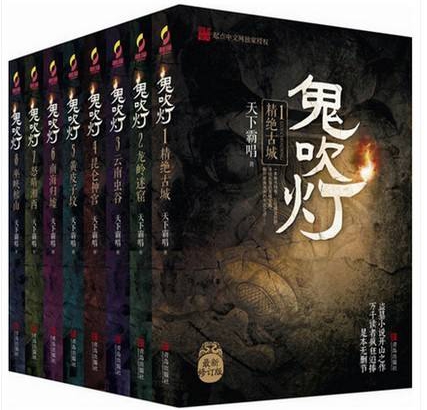Online writings flourish amid China's internet mania
- By Wu Jin
 0 Comment(s)
0 Comment(s) Print
Print E-mail China.org.cn, December 06, 2017
E-mail China.org.cn, December 06, 2017
"The volume of online publication is colossal, so it's impossible to read through every one…But there is never any boundary between serious and online literature, as the latter is definitely an integral part of the literary world," said Mo Yan, Chinese writer and Nobel laureate in literature.
Mo made his remark on the growing influence of online literature in a recent interview with China News Agency.

Speaking in an upbeat tone, he showed his strong confidence in online literature in the country, saying the quality of the online works can be improved with the authors' relentless efforts and mellowing experience.
Yet, will online literature embrace a future envisioned in Mo's forecast? The capital flows and commercial models in the sector may have a big say in this regard.
Although ordinary Chinese may know nothing about China Reading, many of them couldn't be more familiar with the films, web shows and primetime TV series, such as, "Lang Ya Bang", "Secret of a Grave Robber", "Ghost Blows out the Light" and "Fighter of Destiny".
All those creations, adapted from online texts to motion pictures, owed their success to the aforementioned firm, an open publishing and reading platform for online literature.
Following an acquisition involving Tencent Literature and the former Shengda Literature in 2015, the company soon secured a dominant 43.2-percent market share among the five major internet literature online publishers, in addition to iReader Technology, Alibaba Literature, ChineseAll and Baidu Book.
On Oct. 26, this year, China Reading netted an oversubscription rate as large as 625.95 times in Hong Kong. And during its initial public offering (IPO) on Nov. 8, the same year on the Hong Kong (HK) Stock Exchange, its highest stock price was HK$110, a 100 percent rise from the initially-fixed one.
According to the company's IPO prospectus, during the first half of 2017, active users of the reading platform reached 191.8 million, comprising 179.3 million smart phone users and 12.5 million computer surfers. Its business models in forms of VIP charges and categorized authors lead in the online reading industry, thanks to the industrial mogul Wu Wenhui, who initiated and promoted the acquisition and founded the online publishing and reading function.
The major revenue source is readers' fees - exemplified by China Reading's 84.9 percent of income generated by payments for online reading during the first half of 2017.
However, while some begin to question the less diverse composition of income sources, others believe this is a right model focusing primarily on the quality of literary writings.
"How else should online reading platforms be financed other than the reading charges?"asked Ji Yunfei, a PhD student from the Department of Chinese Language and Literature of Peking University.
"Besides, the single source is proof of a stable flow of income, whose continuing fast growth has created a wonder in the industry," he added.
However, the lucrative market of creation and imagination still needs to be regulated as disparate writers flock in the sector, producing mostly vulgar, low-brow and overlapping stories. Some of them even use writing software, available at Taobao.com, China's flagship online shopping network, to help delineate stories, develop plots, collect resources and set imaginative prototypes.
Besides, despite the enormous size of adaptations, few are really successful.
Without serious thought, the market is manic and desirous of quick profit, Ji said.

The successes of several online writers, such as Zhang Wei, best known for his penname "Tang Jia San Shao", whose copyright grossed 122 million yuan (US$18.79 million) last year and who has been the wealthiest online fiction writer for five consecutive years, have stirred many enthusiasts to follow suit. However, their attempts usually end in failures.
According to iresearch.cn, an online consultancy focusing on data analysis, only 28.5 percent of writers among 1,000 respondents selected in a survey were satisfied with their salaries, and half of the respondents were part-timers as writing alone can hardly ensure a life of subsistence, not to mention affluence.
Yet, despite the struggle of domestic writers managing to attract a readership as large as possible, translation has allowed domestic online authors to be welcomed by overseas readers.
A research conducted by iresearch.cn shows that Chinese literature may grow even faster in the overseas market as readers are mesmerized by the fiction focusing mostly on the kung fu world, romance and historical contexts.
The readership of the translated fictions registers an annual growth of 15 percent on average in the past few years with many from developed countries and giving their thumbs up while commenting on the writings.
According to Ji, with online writing going abroad, a window of opportunity for Chinese literature has swung open.






Go to Forum >>0 Comment(s)